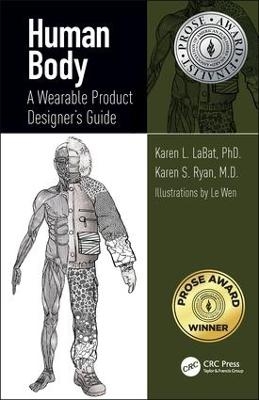
Human Body
Crc Press Inc (Verlag)
978-1-4987-5571-9 (ISBN)
Association of American Publishers (AAP) Finalist for the 2020 PROSE Award
Association of American Publishers (AAP) Subject Category Winner for the 2020 PROSE Award
2019 Taylor & Francis Award Winner for Outstanding Professional Book!
Human Body: A Wearable Product Designer's Guide, unlike other anatomy books, is divided into sections pertinent to wearable product designers. Two introductory chapters include many definitions, an introduction to anatomical terminology, and brief discussions of the body's systems, setting the stage for the remaining chapters. The book is extensively referenced and has a large glossary with both anatomical and design terms making it maximally useful for interdisciplinary collaborative work. The book includes 200 original illustrations and many product examples to demonstrate relationships between wearable product components and anatomy. Exercises introduce useful anatomical, physiological, and biomechanical concepts and include design challenges.
Features
Includes body region chapters on head and neck, upper torso and arms, lower torso and legs, the mid-torso, hands, feet, and a chapter on the body as a whole
Contains short sections on growth and development, pregnancy, and aging as well as sections on posture, gait, and designing total body garments
Describes important regional muscles and their actions as well as joint range of motion (ROM) definitions and data with applications to designing motion into wearable products
Presents appendices correlating to each body region’s anatomy with instructions for landmarking and measuring the body, a valuable resource for a lifetime of designing
For product design examples based on the book go to: https://www.uosportsproductdesign.com/humananatomy-sportsproductdesign-sokolowski-labat
Karen L. LaBat, PhD, is Horace T. Morse Distinguished Professor Emerita, College of Design, University of Minnesota. She was instrumental in establishing the Wearable Product Design Center and the Human Dimensioning© Laboratory at the University of Minnesota. Her research focus is product development for human health and safety and study of the body to improve function and fit of wearable products. Research funding sources include: National Science Foundation, 3M, U of MN Clinical and Translational Science Institute, U of MN Institute for Advanced Study, and others. She has published in Applied Ergonomics; Australasian Medical Journal; Ergonomics; Clothing and Textiles Research Journal; Journal of the Textile Institute; International Journal of Fashion Design, and Technology; and other journals. She was co-editor for the Clothing and Textiles Research Journal Focused Issue on Fashion and Health, co-editor of the Clothing and Textiles Research Journal Focused Issue on Research and Teaching in the 21st Century, and an associate editor for Fashion and Textiles—the Journal of the Korean Society of Clothing and Textiles, and served on the editorial board of the Journal for Health Design. She was co-chair of the U of MN, College of Design, Fashion and the Body 2016 Symposium. Her awards include: International Textiles and Apparel Association Distinguished Scholar, U of MN College of Design Outstanding Research Award, Lectra Innovation Award for Faculty Research, and U of MN College of Design Innovation and Mission Advancement Award. Dr. LaBat received the 2013 U of MN Horace T. Morse Award for Excellence in Undergraduate Teaching and was inducted into the Academy of Distinguished Teachers. Karen S. Ryan, M.D., M.S. has been a Research Associate with the Human Dimensioning© Laboratory, University of Minnesota, since she completed her Masters of Science in Apparel in 2006, with a project on designing apparel for women with posture changes from osteoporosis. Her research grew from her longstanding interest in apparel design and her clinical and teaching practice as a specialist in Physical Medicine and Rehabilitation (PM&R). Her clinical practice focused on musculoskeletal issues, electromyography (EMG), and neurological rehabilitation, with a strong emphasis on patient education. She has served on the faculty of the Department of Physical Medicine and Rehabilitation, University of Minnesota Medical School, including as the Director of the Electromyography Service and as Residency Training Director. She has been an Oral Examiner for the American Board of Physical Medicine and Rehabilitation and the American Board of Electrodiagnostic Medicine. She has made numerous PM&R presentations on a wide range of topics and in many venues, from patient family education sessions to University of Minnesota Television to national PM&R and EMG meetings. She has presented her design and health research in local, national, and international meetings and published in the medical and apparel design literature. Illustrator Biography Le "Lettie" Wen graduated from Tsinghua University, China with a Masters of Literature. She began work on illustrations for this book as a graduate research assistant in the Human Dimensioning Laboratory© at the University of Minnesota. She received a master’s degree in Graphic Design from the University of Minnesota in 2017. Her graduate thesis, titled "Human Anatomy for Wearable Product Designers," combined knowledge from the fields of anthropometry and medical illustration. She developed a unique style to portray the interactions of the human body and a product. She plans to continue work as an illustrator, with an emphasis on anatomical illustration.
The Human Body as Foundation for Developing Wearable Products. Total Body Systems: The basics. Designing Wearable Products for the Head and Neck. Designing Wearable Products for the Upper Torso and Limbs. How to landmark and Measure Lower Torso and Limbs. The Waistline: finding, measuring, and fitting the ever changing landmark. Designing for Hands and Wrists. Designing for Feet and Ankles. Designing for the Total Body. Designing for a Lifetime: Infant through oldest adult.
| Erscheinungsdatum | 01.03.2019 |
|---|---|
| Zusatzinfo | 1 Tables, black and white; 200 Illustrations, black and white |
| Verlagsort | Bosa Roca |
| Sprache | englisch |
| Maße | 156 x 234 mm |
| Gewicht | 1165 g |
| Themenwelt | Informatik ► Software Entwicklung ► User Interfaces (HCI) |
| Studium ► 1. Studienabschnitt (Vorklinik) ► Physiologie | |
| Technik | |
| ISBN-10 | 1-4987-5571-2 / 1498755712 |
| ISBN-13 | 978-1-4987-5571-9 / 9781498755719 |
| Zustand | Neuware |
| Informationen gemäß Produktsicherheitsverordnung (GPSR) | |
| Haben Sie eine Frage zum Produkt? |
aus dem Bereich


